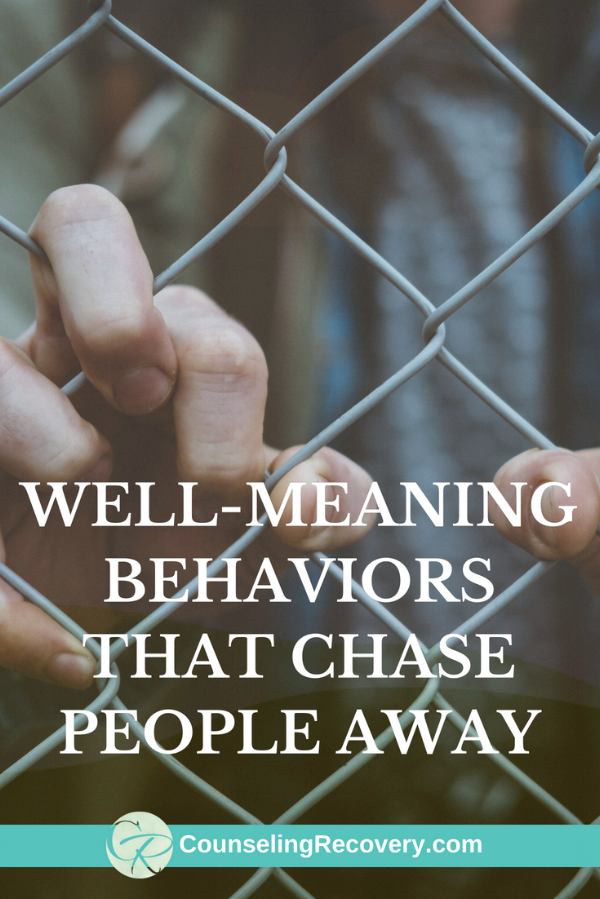Well-meaning Behaviors That Chase People Away
Sometimes, there are certain things that drive people away from us.
Maybe you've had relationships end abruptly and can't figure out why some people seem to drift away. You’re baffled but can’t seem to repair the problem. You know something is wrong, but without feedback it’s tough to guess.
Some behaviors make people want to get away from us, regardless of what we intend. This blog helps to identify those behaviors and transform them into healthy ones.
A Lesson in Boundaries
Recently, I realized something when I visited a dear friend. She tells wonderful stories, but she barely takes a breath before starting another one. I admit that this non-stop talking is a bit exhausting. I don't share this to complain about my friend but to clarify certain behaviors that get in the way of healthy connections. You might recognize these behaviors in your family or maybe even in yourself.
Use this blog as a check list of behaviors to watch out for. Sometimes we are the last ones to recognize our own behavior. These behaviors don't mean that you're a bad friend, or that you're inconsiderate, just human!
The Non-Stop Talker
Maybe you tell a good story, but if the conversation becomes entirely one-sided, you may have trouble with talking too much. This type of chatter is emotionally exhausting for others but if you’re an enthusiastic talker, it’s easy to miss.
Conversations need to be a back-and-forth exchange. Pay attention to how much you're listening. When others avoid eye contact or get fidgety, this is an indication that they're tired of listening. Instead, ask questions to increase mutual participation.
If you’re on the receiving end of this, recognize that when the conversation becomes one-sided, it can be easy to lose your patience. Try to practice compassion. This behavior points to someone who needs to be heard.
Tip: You can let them talk first but know that it's okay to be assertive and volunteer stories of your own.
The Advice Giver
People rarely ask for advice. This is because there are two major needs in a relationship; to be heard and to be understood. When supporting a friend, giving advice seems to be the obvious solution. You might think it’s your job to help but if you jump in without being asked, you can be seen as overbearing. Remember that it's not your problem to solve.
When someone gives you advice, appreciate their effort and reassure them that there are other ways to show support. It's okay to tell them what works and what doesn't.
Tip: If you notice yourself wanting to give advice - take a breath! When it’s not your problem, sometimes it’s kinder to stay silent.
If you are struggling in your relationships, get my free guide.
The Victim
Most people can spot a victim a mile away. Here’s the scenario: this type of person often complains that things just don't work out for them. They focus on the negative things that happen rather than taking action. The negative story becomes their way of life. They seem to crave attention, but don’t know how to get it in a positive way.
This type of person may not see themselves as being negative. Try to gently summarizie what they’ve said to help them hear their own words. While you cannot make them change, you can invite them towards a more positive story.
Tip: If you find that you're focusing too much on the negative, challenge yourself to shift those stories by focusing more on what you can control.
The Controller
No one likes to be controlled but most of us don’t recognize when we’re the one doing it. Your intentions may be to help, but micro-managing people, places, or things makes others want to go away from us. On the surface, they might pretend everything is fine but they find a reason not to hang around.
People control for lots of reasons but underneath is a need to feel safe. Feeling out of control as a child creates this pattern. If you are on the receiving end of someone else’s control, be clear with your personal boundaries, because without them, you'll likely get frustrated.
Tip: At times you may need to be assertive, and other times detachment can help you remove yourself emotionally from their attempt to control. For more on detachment read How Detachment Keeps You Sane in a Chaotic Situation.
The Know-It-All
No one likes a know-it-all, but when someone insists on always being right, others feel devalued. Sharing your knowledge in moderation is fine but when it’s the only source of connection, people lose interest. Everyone wants to be acknowledged for what they know, but too much of a good thing is just that - too much.
If you're in relationship with someone trying to be right, take a breath. They are trying to use their intellect to matter. There is a reason people do what they do and knowing someone’s story usually explains their present behavior.
Tip: Practicing acceptance helps but know your limits. Avoid spending time with them when you’re more likely to react negatively.
Final Thoughts
It's easier to see when others start to annoy you, than it is to see how we do it to others. By focusing your attention on some of these behaviors, you'll be able to recognize which behaviors may be disrupting your relationships. People appreciate someone who is conscious of their needs, and they will tend to be attracted to you, instead of chased away.


